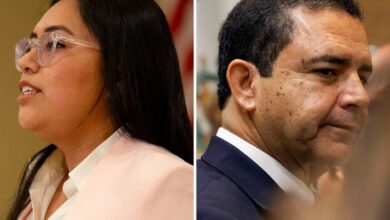Pulse On Policy: Texas 21 Congressional Forum With Video
![]() On Wednesday, May 2, the San Marcos Area Chamber of Commerce partnered with the Austin Chamber Commerce to host and sponsor a forum for the Texas 21 Congressional runoff candidates…
On Wednesday, May 2, the San Marcos Area Chamber of Commerce partnered with the Austin Chamber Commerce to host and sponsor a forum for the Texas 21 Congressional runoff candidates…
![]()
On Wednesday, May 2, the San Marcos Area Chamber of Commerce partnered with the Austin Chamber Commerce to host and sponsor a forum for the Texas 21 Congressional runoff candidates.
The four candidates hope to replace Congressman Lamar Smith. Smith was first elected to Congress in 1986. He announced his retirement from Congress in November 2017.
He currently serves as Chairman of the Science, Space, and Technology Committee and continues to serve on both the Judiciary Committee and the Homeland Security Committee. He is the former Chairman of the Judiciary Committee and the Ethics committee.
Democratic candidates Mary Wilson and Joseph Krosper, as well as Republican Candidates Matt McCall and Chip Roy, attended the event to discuss issues from the recent Tax Reform bill to immigration and education.
The date for the primary runoff election is May 22; Early voting begins Monday, May 14, and ends Friday, May 18.
![]()
- QUESTION 4: In March he (President Trump) imposed tariffs on steel imports and aluminum imports. It moves a cause of concern that the country could be headed for a trade war.

I that there’s been some uncertainty in the news recently about implementation of these tariffs. But broadly speaking do you support the tariffs and why or why not?
![]()
CHIP ROY (R): Sure, as a starting place I think tariffs are generally speaking not a good idea. I think that you ought to be starting the premise of open and free trade and making sure that our goods and services are flowing.
We talked about before in the previous question, without tariffs which I think then get you into the give and take that results in the possibility of tariffs being placed on other goods and services we’re seeing potentially happen here.
Now I say that, but I also think that you gotta look at it in the context of giving the president some room to negotiate and make sure that the other countries are kinda upholding their end of the bargain.
If you look at a lot of the discussions that are going on right now in respect to carving out the number of countries that are free from tariffs, I think those are steps in the right direction. And I’m willing to give the president a good degree of latitude to go negotiate and get these things done.
But at the end of the day, I feel like we should get back to a world where we are not in the tariffs game. That we are getting the deals that we need to get so that we’ve got the free flow of goods and services for all of our needs in the country.
![]()
MARY WILSON (D): We has some agreement on this. I think tariffs are generally speaking, are a terrible idea. In particular, we talk about some of the solar panels that we would like to place tariffs on coming in from China.
One of the problems that that has placed on our solar industry here is that we are now isolating it from Europe. So what we need to do is actually be partners with our European allies because the Chinese government can undercut us financially if we don’t work together.
Because it is a state-supported industry. And one of the things I pointed out over the past year of the campaign trail, Joseph’s heard me say this more than once, China has a billion more people than we do.
Now if we are not going to get into the game and be partners with our European allies in this industry in particular and others that we could talk about, China could just overwhelm us.
China’s economy is becoming more complex, more layered, and more forceful. And they have more people. So what are we going to do about that? We cannot continue a isolationist policy, and that’s what tariffs do.
And the history of tariffs in our country initially started as a way to bring in income to the United States. At the time, early 1900’s it switched more to protectionist type policy. And in general, we saw during the depression that it was probably not going to be something that worked.
I know economists debate a little bit about the effects of the tariffs that led up to the depression and how much impact it had. But it certainly had some impact.
So we don’t wanna go in the direction that led us into a depression. We don’t want to go in a direction that isolates us from our allies and that’s what we’re doing right now. And this president is not a great negotiator, but he’s really good at chaos.
![]()
MATT MCCALL (R): Oh my. I guess you missed the news about North and South Korea when you said that he’s not a great negotiator. That’s what negotiations look like, when you’re negotiating on multiple levels.
And tariffs are just a stick. We don’t want tariffs, but if you’re not willing to use the stick…I mean I think the president probably arranged for the president of Taiwan to call him, and he took the phone call right after he received the nomination…or actually after he was inaugurated.
And, whenever it was. Because everybody said, “Oh my god, don’t you know that the world’s gonna end because the one China policy,” and he said, “I know all about the one China policy, but that’s their policy; it’s not my policy. Unless they want to help us reform Korea.” And the way you get to China is trade. We probably employ I don’t know half a million maybe a million.
Or they employ half a million, a million Americans. We employ 100 million Chinese. Okay they need us worse than we need them.
We are now going to, I am certain of it, realign our priorities. We are going to dump Pakistan and realign our priorities and draw close to India. And that’s where you get another 1.3 billion people to balance out China.
They are absolute democracy; 350 million people that speak English, British common law. They’re our natural allies.
And so it is renegotiating, and it’s not chaos. I am absolutely not an isolationist. I traveled in 45 countries around the world. We wanna do trade, but we want fair trade where the American worker benefits. That’s our job.
Our job isn’t to be fair to everybody else; it’s to be fair to our workers and increase our standard of living. So, the trade deals need to be free and fair, and I think the president will do a good job on that.
And I don’t think that anybody on this side is a isolationist or has been implied that we’re somehow racist because we’re for America. And we wanna control our borders and who comes in the United States.
Six and a half million people in the last 10 years at least have immigrated legally, and we need to get the immigration and the trade with people that we currently have relationships with. And I think that we can do that.
![]()
JOSEPH KOPSER (D): Yeah, in reference to tariffs, this is very clear. This is a very clear example where the current administration and the leadership in the Republican House and Senate, is allowing this back and forth that is not negotiating.
It is not negotiating. It is leadership by Twitter. It is leadership by the last thing you saw on Fox News. This is not good for the business community; it is not good for everyday Americans.
Go talk to anybody associated with the sale and distribution of Harley Davidson’s. Ask them what they think about these tariffs. Talk to anybody involved in farming and is looking at an opportunity right now to lose out as movement moves towards Brazil as our products become more expensive because of the trade and tariff war.
Whatever you wanna say about how this president negotiates, I want to distinguish between a disciplined approach and a blind squirrel occasionally finding a nut.
I wanna push back on the belief that somehow the current administration led the way on North and South Korea at the table. Let us not forget that North and South Korea had actually been involved in this since their split in the 1950’s. It was when the North Korean delegation visited for the first time South Korea during the Olympics, and they witnessed first hand how far behind they were.
When they saw the erratic and lack of leadership coming from the United States, who doesn’t even have a South Korean member of the State Department, there is no one representing United States in South Korea.
So we have to distinguish between a planned, a disciplined approach that which comes from experience and understanding of how important these issues are as opposed to flying off the cuff and then running and taking credit for whatever happens to happen on the world stage.
![]()






